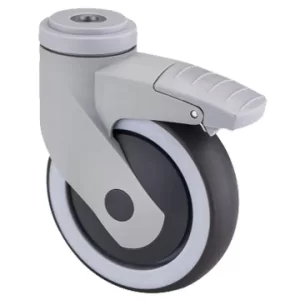Henyuan Medical Caster: Complete Guide to Hospital Bed Wheels & Casters
Introduction: Why Hospital Bed Wheels Matter
In hospitals, nursing homes, and home care environments, hospital bed wheels are essential for patient safety and caregiver efficiency. Hospital bed caster wheels allow easy movement, smooth transfers, and precise positioning.
Choosing the right hospital bed wheels for sale ensures comfort, hygiene, and long-lasting performance. At Henyuan Medical Caster, our solutions include wheels for hospital bed, hospital bed caster wheels, and ESD casters for hospital bed, tailored to meet all healthcare mobility needs.
Modern hospital beds with wheels also require features like locking mechanisms, noise reduction, and antimicrobial protection to comply with strict hospital standards.
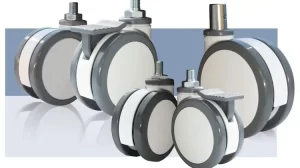
1. Types of Hospital Bed Wheels
Henyuan Medical Caster offers various casters for hospital beds:
Swivel Casters : 360° rotation for tight spaces.
Rigid Casters: Ensure straight-line stability.
Plate Mount : Suitable for heavy beds.
Stem Mount: Easy installation on adjustable beds.
Stainless Steel Casters: Rust-resistant for high-moisture environments.
Choosing the correct caster for hospital bed depends on bed type, floor surface, and load requirements.
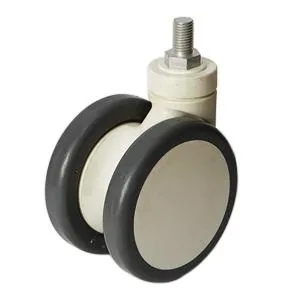
2. Key Features of Hospital Bed Casters
Henyuan Medical hospital bed caster designs focus on safety, hygiene, and usability:
Dual-Wheel Design: Smooth rolling and weight distribution.
Locking / Brake Systems: Single-lock, total-lock, or central-lock to secure beds.
Leveling / Height Adjustment: Compensates for uneven floors.
Kingpinless Construction: Reduces wear and extends lifespan.
Maintenance-Free Design: Sealed bearings and dust-resistant.
Noise Reduction: Soft tread and low-noise bearings.
Antimicrobial Coatings: Reduce bacteria growth.
ESD Casters for Hospital Bed: Prevent static buildup in operating rooms and ICU areas.
Our hospital bed castors are designed to meet strict medical safety standards while supporting caregiver efficiency.
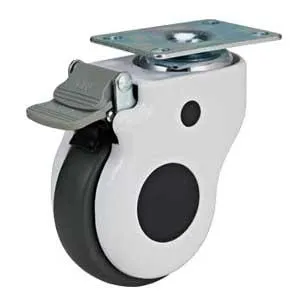
3. Specifications and Materials
Henyuan Medical Caster hospital bed wheels come in multiple sizes and materials:
Wheel Diameter: 2″–12″ (most hospital beds use 8″ wheels).
Load Capacity: Light (50–100kg), Medium (100–300kg), Heavy (>300kg).
Materials:
Polyurethane: Durable, floor-friendly.
Rubber: Shock-absorbing, quiet.
Nylon / Engineering Plastics: Lightweight, chemical-resistant.
Stainless Steel: Corrosion-proof.
Cast Iron: High-load applications.
Phenolic Resin: Heat-resistant, suitable for sterilization.
Polyolefin: Lightweight, cost-effective.
Sealed bearings and high-quality construction ensure hospital bed caster wheels roll smoothly and last long.
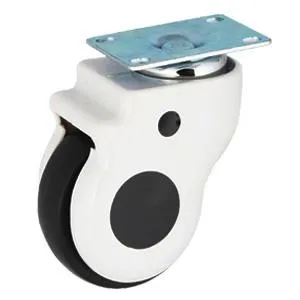
4. Application Environments
Henyuan Medical Caster hospital bed wheels are suitable for:
Hospital Wards: Easy patient transfers.
Operating Rooms & ICUs: Use ESD casters for hospital bed and antimicrobial options.
Nursing Homes & Rehabilitation Centers: Safe repositioning of residents.
Home Care Beds: Convenience and flexibility.
Outdoor or Specialized Surfaces: Durable wheels for uneven floors.
Hardwood & Smooth Floors: Soft tread prevents damage.

5. Replacement and Maintenance
Replacement wheels for hospital beds must match original mounting type, diameter, and load rating.
Maintenance Tips:
Clean wheels regularly to remove debris.
Lubricate bearings for smooth operation.
Inspect locks and brake systems.
Replace worn or damaged hospital bed caster wheels promptly.
Proper maintenance ensures hospital bed wheels remain safe and durable.
6. Pricing and Purchasing Options
Hospital bed wheels price varies based on material, size, load capacity, and features. Retail ranges from $10–$50 per wheel, while bulk orders reduce cost.
Henyuan Medical Caster offers:
Hospital bed wheels for sale: Matched sets for consistent performance.
Wholesale hospital bed on wheels packages for hospitals and distributors.
Custom solutions for load, material, and diameter.
7. Common FAQs
Q: Do all hospital beds come with wheels?
A: Yes, most modern hospital beds with wheels include them for mobility, often with locking mechanisms.Hospital beds are quite different from standard adjustable beds for many reasons. One feature we’ll highlight here is the inclusion of wheels on hospital beds. The heavy-duty wheels let these models be moved easily and quickly. While this is necessary for a fast-paced healthcare setting, can wheels help you at home? Yes, and you’ll find them very useful for homecare needs.
Q: Can I replace only one wheel?
A: Possible, but replacing a full set of replacement wheels for hospital beds ensures stability.We’d like you to buy four(one set for the replacement).
Q: What types of wheels are best for ICUs?
A: ESD casters for hospital bed and antimicrobial hospital bed caster wheels are recommended.
The best hospital bed wheels for Intensive Care Units (ICUs) focus on safety, hygiene, maneuverability, and durability:
Safety and Hygiene
Antimicrobial Casters: Reduce bacterial growth for sterile environments.
Washable Casters: Easy to clean, minimizing germ accumulation.
ESD (Electrostatic Discharge) Casters: Protect sensitive ICU equipment from static.
Secure Locking Mechanisms: Total lock or directional locks prevent unwanted movement.
Maneuverability and Noise Reduction
Polyurethane or Soft Rubber Wheels: Quiet, smooth, and floor-friendly.
Precision Ball Bearings: Reduce friction and noise.
Swivel & Twin-Wheel Casters: Offer easy turning and stability, especially on uneven surfaces.
Durability and Ease of Use
Stainless Steel or Reinforced Composites: Long-lasting and resistant to corrosion and cleaning agents.
Ergonomic Design: Reduces push/pull effort and protects bearings.
Load Capacity: Choose appropriately to safely transport patients and equipment.
In short, ICU hospital bed caster wheels should combine hygiene, safety, smooth movement, and durability to support patient care and protect equipment.
Q: What affects hospital bed wheels price?
A: Size, material, load capacity, feature set (locking, ESD, antimicrobial), and quantity.
Q: What are the wheels on a hospital bed called?
A: A hospital bed with wheels is commonly called a stretcher, gurney, or trolley, according to some sources. These terms are often used interchangeably to refer to a wheeled bed used for transporting patients, especially in emergency situations.
While “hospital bed” might also be used, it’s more general and can refer to a stationary bed as well. Stretchers, gurneys, and trolleys are specifically designed for movement and often have features like adjustable height and head/foot sections for patient transport and care.
Q: How should I inspect hospital beds daily?
A: Staff should visually check hospital bed wheels, bed frames, and components at the start of each shift. Look for loose bolts, worn parts, or visible damage.
Q: How often should preventive maintenance be performed?
A: Perform a detailed inspection annually using your facility’s PM team or a third-party service. This includes checking electrical, mechanical, and sanitary components.
Q: How should cables be managed?
A: Organize all cords and wires neatly to prevent tangling, damage, or tripping hazards around hospital beds on wheels.
Q: How should the bed frame be cared for?
A: Inspect for corrosion or structural damage, lubricate mechanical parts as recommended, and have prompt repairs done by an authorized technician if needed.
Q: How should hospital beds be cleaned?
A: Wipe frames and surfaces with a soft cloth, warm water, and mild detergent. Dry completely to prevent contamination. Avoid harsh chemicals that could damage bed surfaces.
Q: How should mattresses be maintained?
A: Inspect mattresses for cuts, tears, punctures, or stains at every patient transfer or discharge. Clean according to manufacturer instructions and replace mattresses every 5–6 years or if damaged. Use barrier protectors to extend mattress life.
Q: What does preventive maintenance (PM) include?
A: PM covers:
Electrical inspection: batteries, wiring, and controls.
Mechanical inspection: bolts, actuators, hospital bed caster wheels, steering, and brake locks.
Sanitary inspection: edges, seams, and contamination checks.
Q: Why is maintenance important?
A: Regular inspections, cleaning, and repairs keep hospital bed wheels and the entire bed functional, safe, and comfortable, especially in high-acuity units like ICUs.
8. Conclusion: Why Choose Henyuan Medical Caster
Henyuan Medical Caster provides premium hospital bed wheels, combining:
Durability and smooth maneuverability
Safety with locking and central-lock systems
Hygiene with antimicrobial and ESD options
Compatibility with multiple bed types
Customizable options for load, material, and wheel size
For hospital bed caster, hospital bed caster wheels, wheels for hospital bed, or wholesale hospital bed on wheels, Henyuan Medical Caster ensures reliability, safety, and efficiency for every healthcare facility.
If you want more medical spare parts,you can visit our other website: medicalfurnitures.com
Bangkok in Thailand
Chiang Mai in Thailand
Pattaya in Thailand
Ayutthaya in Thailand
Phuket in Thailand
Hat Yai in Thailand
Khon Kaen in Thailand
Udon Thani in Thailand
Nakhon Ratchasima in Thailand
Chon Buri in Thailand
Si Racha in Thailand
Phitsanulok in Thailand
Lampang in Thailand
Surat Thani in Thailand
Ubon Ratchathani in Thailand
Nakhon Si Thammarat in Thailand
Rayong in Thailand
Nakhon Pathom in Thailand
Nonthaburi in Thailand
Pak Kret in Thailand
Si Sa Ket in Thailand
Trang in Thailand
Prachuap Khiri Khan in Thailand
Chachoengsao in Thailand
Chanthaburi in Thailand
Loei in Thailand
Nakhon Nayok in Thailand
Nakhon Phanom in Thailand
Mukdahan in Thailand
Maha Sarakham in Thailand
Sakon Nakhon in Thailand
Sukhothai in Thailand
Phichit in Thailand
Kamphaeng Phet in Thailand
Phayao in Thailand
Nan in Thailand
Phrae in Thailand
Uttaradit in Thailand
Phatthalung in Thailand
Satun in Thailand
Ranong in Thailand
Krabi in Thailand
Phang Nga in Thailand
Kanchanaburi in Thailand
Ratchaburi in Thailand
Phetchaburi in Thailand
Chumphon in Thailand
Narathiwat in Thailand
Pattani in Thailand
Songkhla in Thailand
Yala in Thailand

